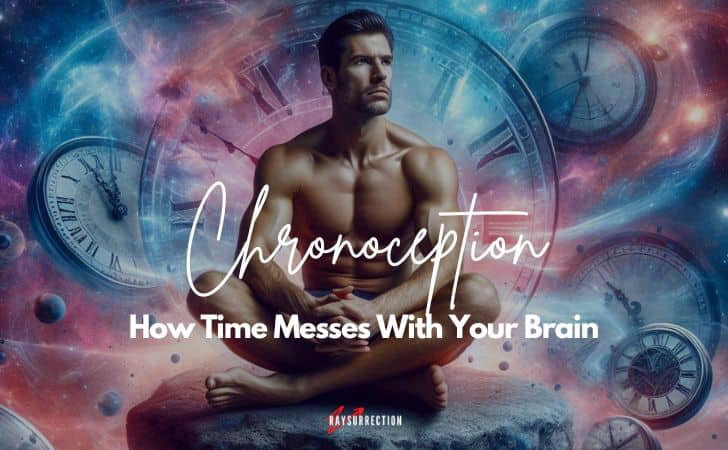Time is a slippery little trickster. One moment, an hour feels like forever, and the next, three years vanish in a blink. Brains are absolute frauds when it comes to keeping track of time, and nobody is safe. Figuring out why time speeds up, slows down, or just gets lost is one of the strangest mysteries of being human.
Why Five Minutes Feels Different Every Time
Time should be predictable, but it refuses to behave. Five minutes spent waiting in line feels like a slow death, while five minutes of a good conversation disappears instantly. The brain isn’t measuring time like a stopwatch; it stitches moments together in ways that make no sense. Different situations stretch and shrink time in ways that defy logic.
- Boredom expands every second into an eternity. If nothing captures attention, the brain starts analyzing every tick of the clock. A lack of stimulation makes the mind hyper-aware of time passing. Five minutes feels like an hour in the wrong conditions.
- Excitement compresses time into nothingness. If an experience is captivating, the brain stops bothering to measure time. A thrilling movie or game can make hours vanish instantly. The lost time only becomes obvious after the event ends.
- New experiences stretch time out in strange ways. If a situation feels unfamiliar, the brain processes every detail more carefully. A single day in a new place feels longer because of the increased attention. The extra effort forces the mind to slow down time.
- Repetitive routines make time slip away unnoticed. If nothing changes, the brain stops logging unnecessary details. A week filled with identical tasks blends together into a single moment. Entire years disappear without leaving clear memories.
How often do you feel time drag or disappear? If waiting in line feels unbearable, focusing on small details might help stretch those moments. If time keeps slipping away unnoticed, breaking routines may slow things down.
The Brain’s Timekeeping System is Completely Unreliable
Brains were never designed to be accurate clocks. The way time is perceived depends on focus, mood, and even body temperature. Internal clocks work more like bad guesswork than actual science. Time perception is as much about emotions as it is about logic.
- Fear stretches every second into forever. If danger feels imminent, the brain floods with adrenaline and absorbs every detail in high definition. A few seconds of panic feel like minutes of torture. The mind goes into survival mode and stretches time artificially.
- Being late makes time accelerate like a runaway train. If urgency kicks in, the brain stops noticing small increments of time. A simple morning routine suddenly takes twice as long. Every task feels rushed, yet the clock moves too fast.
- Fatigue turns time into a complete blur. If exhaustion sets in, the brain struggles to process events efficiently. Hours disappear without leaving strong impressions. Fatigue makes time feel unreal and fragmented.
- Temperature messes with time perception in sneaky ways. If extreme heat or cold takes hold, time seems to move differently. Being too cold makes moments drag, while overheating makes everything feel sluggish. The body affects time just as much as the mind does.
- Drugs and substances distort time perception dramatically. If stimulants or depressants alter brain chemistry, time shifts unpredictably. Caffeine can make moments feel fast, while alcohol or sedatives can slow things down. External influences change the way time is experienced.
When does time feel the most distorted for you? If exhaustion warps time constantly, prioritizing rest could restore a more stable sense of time. If fear stretches seconds too long, learning to manage stress might help time flow more smoothly.
How to Trick Time Into Working in Your Favor
Time perception may be unreliable, but that makes it easy to manipulate. Small adjustments to daily routines can stretch enjoyable moments or shorten painful ones. Instead of becoming a victim of the brain’s terrible timekeeping, certain tricks help bend time to personal advantage. Reality won’t change, but perception definitely will.
- Breaking routines makes time feel slower. If tasks happen in the same order every day, time speeds up. Shuffling the order forces the brain to pay attention. New patterns help stretch out time perception.
- Focusing on details stretches moments into bigger memories. If small details receive extra attention, time feels richer. The way light moves or the sound of distant conversations creates a stronger imprint. More observations make moments feel longer.
- Interrupting boring moments prevents time from dragging. If dull activities get broken up with small changes, time stops feeling endless. Standing up, stretching, or stepping outside resets perception. A few interruptions help keep the mind from slipping into boredom.
- Deliberately rushing through tedious tasks shrinks wasted time. If an unpleasant activity becomes a race, it ends sooner. Setting a personal deadline speeds up time perception. Treating routine like a challenge makes it disappear faster.
- Meditation and mindfulness create time awareness. If attention stays in the present moment, every second becomes noticeable. Slowing breathing and focusing on sensations stretches time. Awareness brings time into sharper focus, making moments feel longer.
Would you rather stretch time or speed it up? If slow days feel unbearable, filling them with small activities might make them pass faster. If time flies too fast, adding new experiences might help slow things down.
The Future of Time Perception
Science may one day unravel how time perception works, but for now, it remains a personal mystery. Every person experiences time differently, shaped by emotions, experiences, and habits. Since time itself doesn’t change, learning to manipulate perception is the closest thing to controlling time. Those who understand how time bends gain an advantage in making life feel richer and more intentional.
- Technology could rewire how people experience time. If virtual reality alters time perception, future generations may experience time differently. Immersive environments could make long hours feel like minutes or vice versa. New technology may redefine how time feels.
- Society may reshape how time is valued. If workplaces embrace flexible schedules, the modern sense of time could shift. Working fewer hours while maintaining productivity could change time’s role in daily life. A cultural shift could redefine how time is measured.
- Personal choices affect time more than external forces. If routines remain static, time will continue feeling fast. A commitment to new experiences slows time naturally. Individuals have more control over time perception than they think.
- Artificial intelligence could redefine time efficiency. If AI handles repetitive tasks, people may feel like they have more time. Reduced workload could make life seem longer and less rushed. Technology may influence time perception in unexpected ways.
What kind of relationship do you want with time? If life feels rushed, experimenting with time perception tricks could bring more balance. If time drags, learning to shift attention might make moments feel less endless.

We earn a commission if you click this link and make a purchase at no additional cost to you.
Chronoception: How Time Messes With Your Brain
Time remains one of the greatest mysteries of existence, constantly shifting based on perception. Since no one truly controls time, shaping how it feels becomes the next best option. If you understand how emotions, habits, and routines affect time, you can influence your experience - anyone can. The clock may not change, but perception always can. If time feels out of control, experimenting with these tricks could make life feel more intentional and satisfying.




